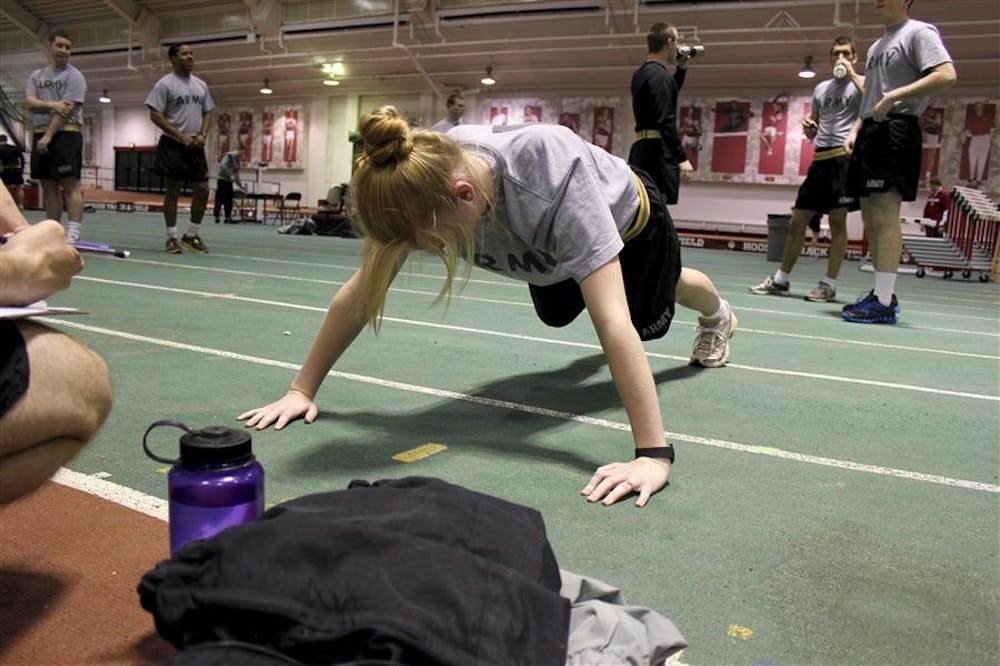Jenna Moore, a cadet in the IU ROTC program, said she is unphazed by the decision Thursday to lift the ban on women in combat roles.
She does not desire a combat position. But she knows women who are ready.
“I am excited for them,” Moore said. “My twin sister would love to go into a combat role.”
Moore’s sister is currently attending the Naval Academy at Annapolis in Maryland.
In 1994, the U.S. Department of Defense implemented a policy to keep women out of ground combat. They were not allowed to serve in units smaller than the brigade level — a shift from earlier legislation enacted by Congress that effectively banned women from all combat roles, according to the Congressional Research Service.
The decision to remove the ban was supported by the Joint Chiefs of Staff in a letter written by its chairman, General Martin Dempsey, and sent to Secretary of Defense Leon Panetta 15 days prior to Panetta’s announcement.
However, it is unclear whether this was politically motivated by an American Civil Liberties Union lawsuit, the next bullet point on the list of legal reforms related to the military or strictly a military decision.
“I kind of always figured it was inevitable,” Cadet Angela Bowman, a junior, said. “First, women in the military were allowed to join at all and then open gays and lesbians started serving.”
Cadet Battalion Commander John Keenan, a cadet in his senior year, had a different perspective.
“I didn’t hear any rumors in the six years I served previously because we were so busy with operations,” Keenan said.
He joined the Army National Guard six months before 9/11 and was part of the Iraq invasion force before qualifying to join the Special Forces.
“We kept an ear towards politics, but we have no effect on policy,” Keenan said. “I can tell you we did occasionally work with women in the military that were involved in civil services and humanitarian projects.”
Lt. Col. Michael Ogden is the officer in charge of IU’s ROTC program.
“I think that people have realized already over the past 10 years that they’re going to be in combat,” Ogden said. “What happens when they (women) come to me is they want to become leaders and know what it takes to get there. They don’t ask if they’ll be in combat.”
Even for those women in the military that are not affected by the changes, many opportunities will be opening up.
A defense official from the department’s Press Operations Center said approximately 230,000 positions will be open to women by Jan. 1, 2016.
These positions will be in areas such as artillery, armor, infantry and special warfare.
As for female civilians, it is unclear whether they will have to register for Selective Service in the future.
According to the Selective Service System’s website, the main reason why women were not required to register was because they could not be involved in ground
combat.
Blake Johnson, communications director for Rep. André Carson, D-Ind., a member of the House Armed Services Committee, sent a statement saying Carson’s office has yet to receive or review legislation that would require women to register for the draft.
“The perception is probably that after 10 years of being at war that it’ll be hard for me to find people,” Ogden said. “I have more people coming than I have slots for, just like Coach Smith probably has more players wanting to join IU’s baseball team than he has room for.”
This surplus of applicants is evident not just to the command but to cadets, as well.
“It’s definitely becoming a competition of quality over quantity,” Cadet Casey Flynn, a senior, said.
Flynn ranks in the top 10 percent of cadets in the country according to her ROTC assessment scores. These scores measure scholastic, athletic, and leadership abilities, Ogden said. Senior year ROTC cadets go through what Ogden calls the “Army combine,” a 29- day evaluation that is roughly 30 percent of their overall assessment as cadets.
Most of the female cadets at Monday’s physical training session were not concerned by the lift on the ban because they have already dedicated themselves to their selected positions. But freshman Aryn Morrison, who is still unsure, considered taking advantage of these new openings.
“When I heard it was an opportunity and you could be the first (woman in combat), I think I wanted to do it for the challenge,” Morrison said.
Morrison was the only female cadet the IU ROTC sent with the 10-cadet team this fall to the Ranger Challenge, an intense competition between the ROTC programs across the country.
“You’re a student first,” Ogden said. “The ROTC is something you do above and beyond your bachelor’s degree.”
IU’s ROTC has open enrollment for freshmen and sophomores and offers classes for leadership and physical training, even for those not interested in joining the Army.
Choosing combat
IU ROTC women discuss their possible futures on the front lines

Get stories like this in your inbox
Subscribe



